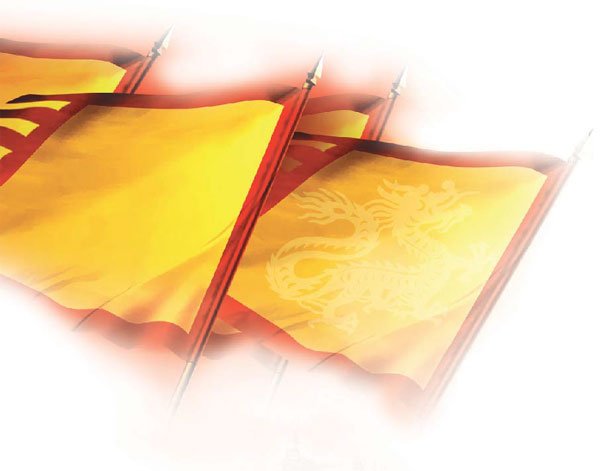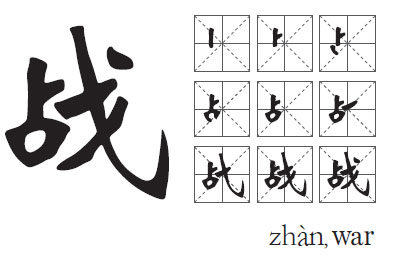Words of war take up strategic positions in the language

The language of armed conflict is used not only in sports, but also in business, relationships, education and almost every other pursuit
In the modern age, if someone pushes the wrong button, the world could come to an end.
In fact this nearly happened in 1983, when Russian Lieutenant Colonel Stanislav Petrov was emphatically told by a computer that US nuclear missiles were flying his way. Fortunately he elected not to retaliate against what turned out to be sunspots and a malfunction, but that, as they say, is a story for another day. Still, we can be grateful that he did not set off war, or 战争 (zhànzhēng).


High-tech weapons, scheming and plotting, geopolitics, and social and economic factors all come into play in modern conflicts, making them a dangerous business.
By comparison, ancient wars seemed simple and almost innocent. Just look at the character 战. In its traditional form '? 單 (dān) on the left represents its pronunciation and 戈 (gē) on the right side represents the shape of a weapon, a dagger with a long shaft. An alternative explanation of its origin is that the left side resembles a beast or 兽 (shòu) and together, the character means "to fight beasts with a weapon".
Just to give you an idea how straightforward war used to be, there was even war etiquette some 3,000 years ago: You should send your enemy an invitation for combat and show up at the mutually agreed upon time and place, list all your troops, and conduct a religious ceremony before the fight began. These were civilized attempts at mass killing. You were not to attack your enemy state after its leader died or was devastated by natural disasters, or your victory would be considered unjustified and dishonorable.

It was later during the Spring and Autumn period (770-476 BC) that war became an art of trickery and deceit, when different states frequently clashed and vied for supremacy. The military mastermind Sun Tzu was a product of this time and famously stated: "All warfare is based on deception." (兵者,诡道也。Bīngzhě, guǐdào yě.)
It has been downhill ever since.
The character '?was later simplified into 战. Its meaning is still straightforward in constituting a series of words and phrases. War is 战争 (zhànzhēng) while combat is 战斗 (zhàndòu). Soldiers are 战士 (zhànshì) and comrades who fight together are 战友 (zhànyǒu, literally "war friends"). You may find yourself in a skirmish and need several words for war: To declare war is 宣战 (xuānzhàn); while the fight is in progress, use the word 交战 (jiāo zhàn, engage in combat). A temporary truce is 休战 (xiūzhàn), while a definitive cease-fire is 停战 (tíngzhàn). When it comes to describing the results of war, you can either 战胜 (zhànshèng, win) or 战败 (zhànbài, lose). But the latter word is tricky in application; It could mean the opposite outcome when used differently. If there is no object behind it, it means lose as in 他们战败了 (Tāmen zhànbài le, they lost the war). However, in the presence of an object, as in 他们战败了敌人 (Tāmen zhànbài le dírén), it means "They have beaten the enemy."
We all wish for world peace, but who does not enjoy the adrenaline rush of a harmless conflict? The closest thing? Sports. That is probably why you find martial language invading the sports page. A challenge is 挑战 (tiǎozhàn), and a record is 战绩 (zhànjì). For instance, 湖人队上个赛季战绩辉煌 (Húrénduì shàng gè sàijì zhànjì huīhuáng. The Lakers kept a great record last season). To prepare for a game, they claim they are "preparing for war" or 备战 (bèizhàn). Two teams going against each other? Use the term 对战 (duìzhàn), or "face each other in a battle". You have just won your first game? Say 初战告捷 (chū zhàn gào jié), or "win the first combat", and you will instantly feel like a noble general. 背水一战 (bèi shuǐ yī zhàn), literally "fight with one's back to the river", describes a "fight or die" scenario. In sports, it is the "win or out" match. Feeling even more dramatic than usual? Apply these words in your daily life.
Use 奋战 (fèn zhàn) to mean "fight hard" for your college examination, an important project, or perhaps for the future of mankind. 速战速决 (sù zhàn sù jué) is a military tactic, meaning "to attack and finish a battle quickly" as in a lightning war. But you can still use it in the most boring scenario to mean "to finish a task quickly".
As Sun Tzu's The Art of War appeared on the nightstand of every business executive, a new battlefield opened up for 商战 (shāngzhàn), or "business fights". Strategy in general is 战略 (zhànluè). Everyone can have a good fight nowadays in some way: Writers have a 笔战 (bǐzhàn), or "pen fight", and people who love to argue can have a 舌战 (shézhàn), or "tongue fight". Even passive-aggressive couples can have 冷战 (lěngzhàn) or "cold war".
But the consequences of a real war are chilling, and the character 战 also means "to shiver or quiver", as in 寒战 (hánzhàn, a cold shiver) or 战栗 (zhànlì, to shudder). The phrase 战战兢兢 (zhàn zhàn jīng jīng) describes a person trembling with fear.
We may live in a different era, facing much harder and complicated battles we have brought upon ourselves, but they are also the challenge of our times in order for us to grow. And remember, you can't spell "challenge", or 挑战, without 战.
Courtesy of The World of Chinese, www.theworldofchinese.com
The World of Chinese
(China Daily European Weekly 10/01/2015 page27)
Today's Top News
- Japan tempting fate if it interferes in the situation of Taiwan Strait
- Stable trade ties benefit China, US
- Experts advocate increasing scope of BRI to include soft power sectors
- New engine powers cargo drone expansion
- China to boost green industry cooperation
- Manufacturing PMI rises in November






























